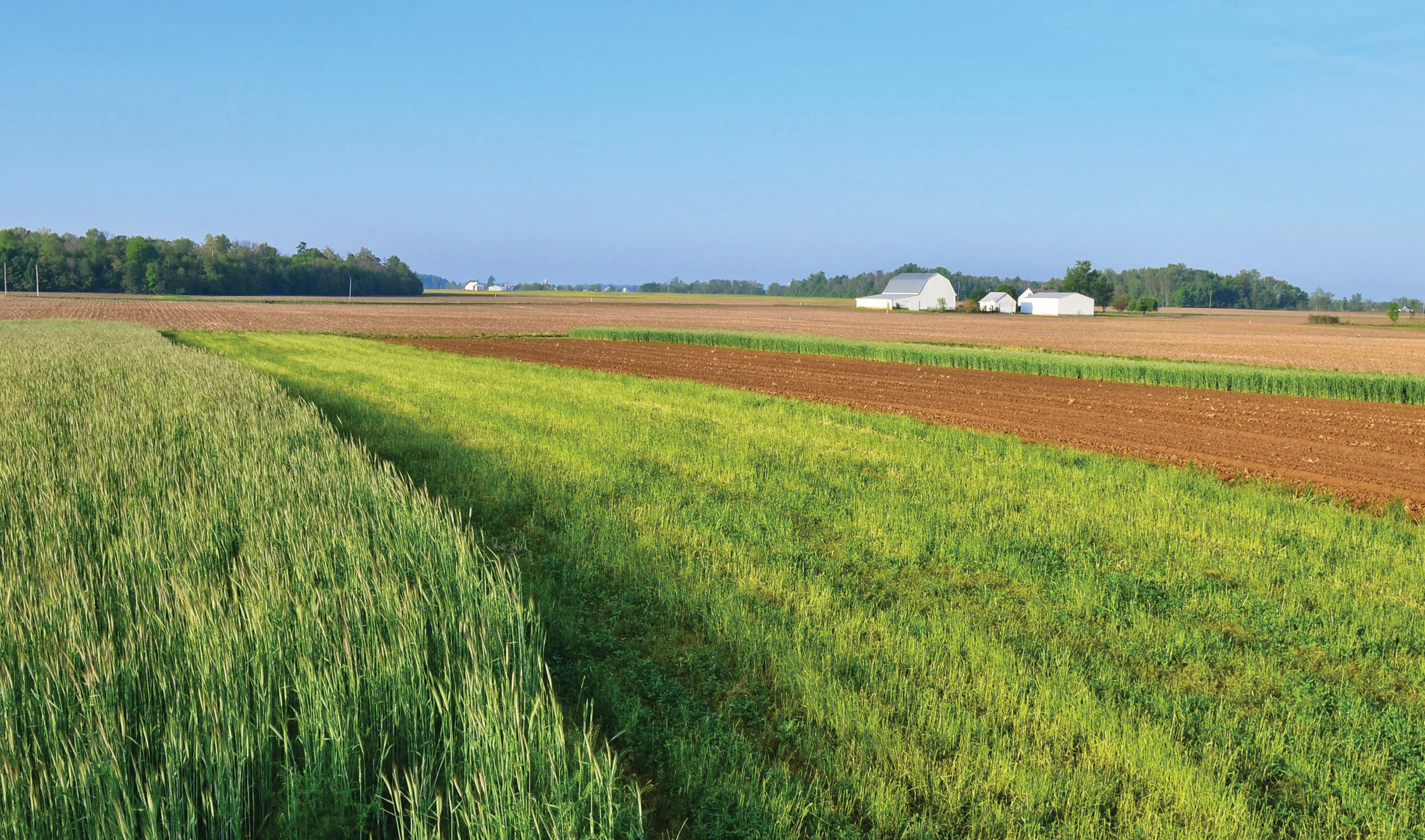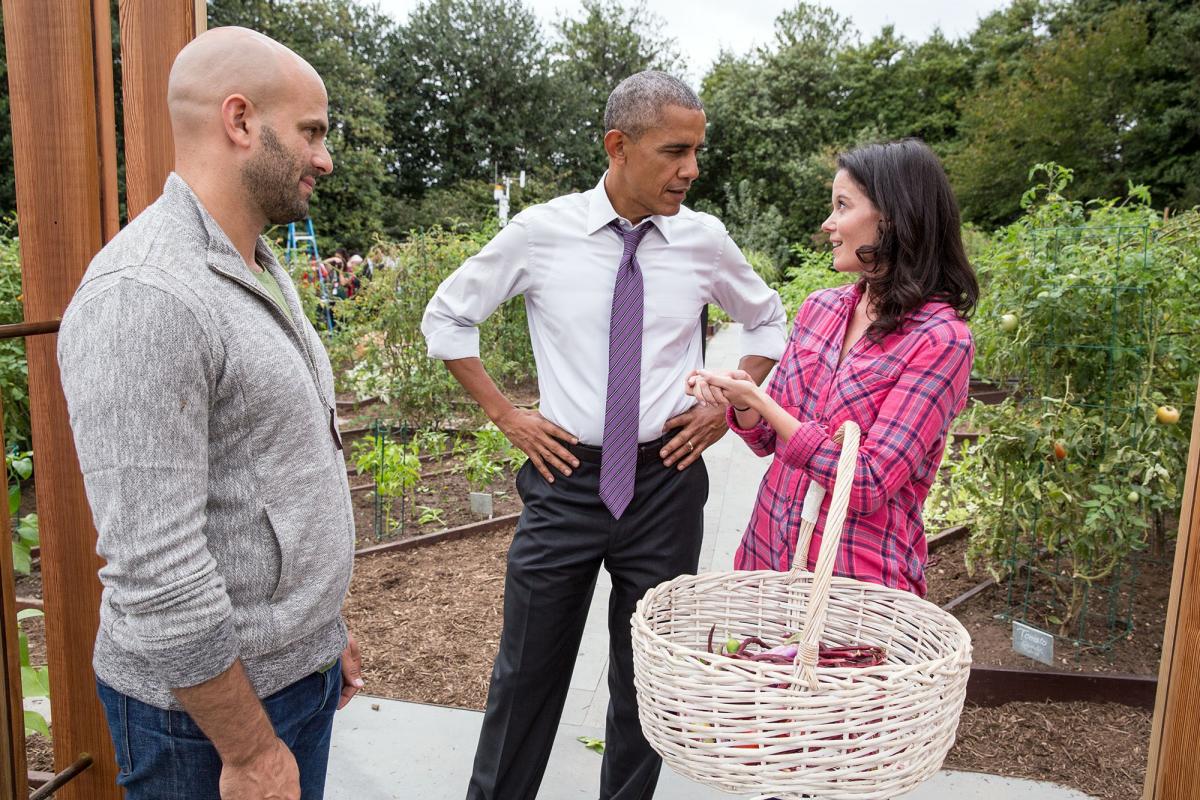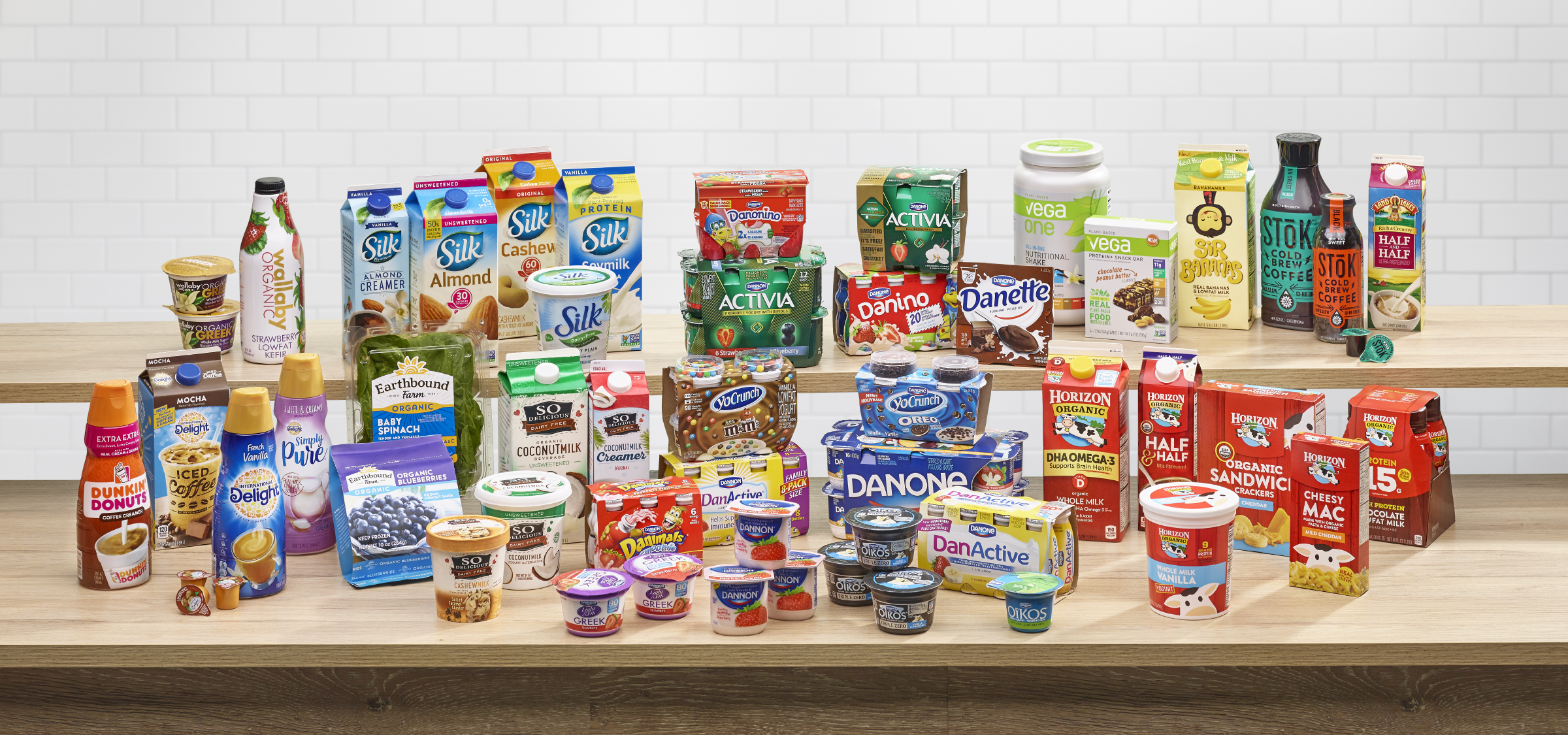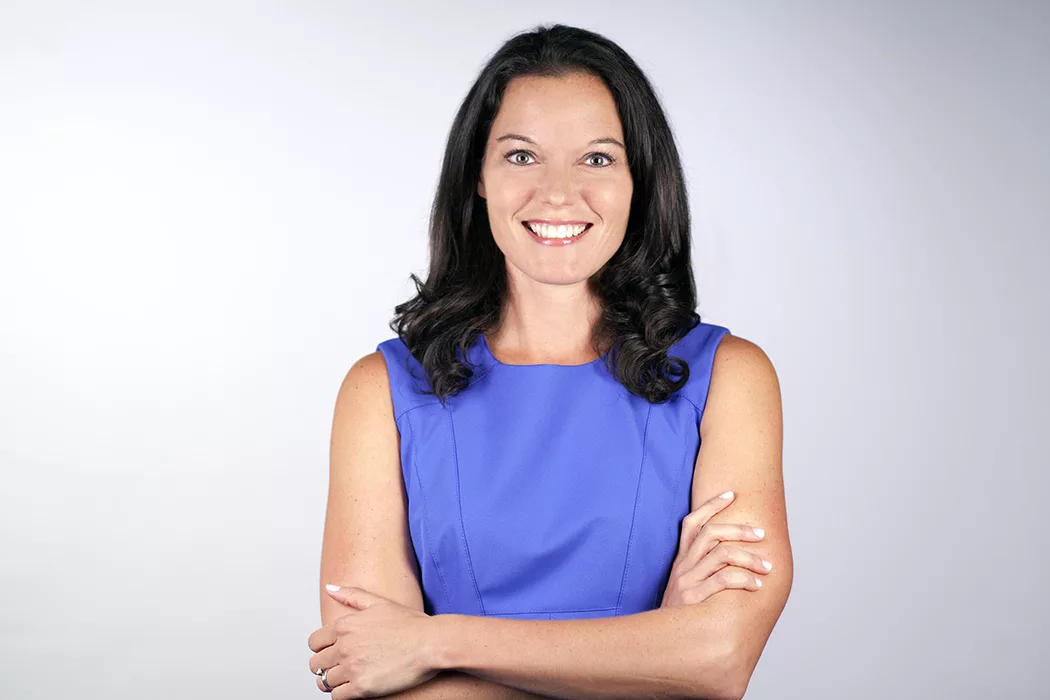If you want to understand how varied Debra Eschmeyer’s career has been, just look at some of her workspaces. Ten years ago, she spent her days in a farm field in New Knoxville, Ohio. She’s worked in the White House as senior policy advisor for nutrition to President Obama and executive director of First Lady Michelle Obama’s “Let’s Move!” program. Today, as vice president for communications and community affairs at DanoneWave, her office in Broomfield, Colorado, has a sweeping view of the Rocky Mountains, and this is where she now works to bring health through food to as many people as possible from inside one of the world’s biggest conscious companies.
“I’ve had a diverse, non-linear career,” she allows. “Farming, nonprofit, government, private sector.” Yet behind all the varied exteriors, Eschmeyer has had a clear mission every step of the way: making safe, healthy, delicious food available to all while restoring the connection between food, community, land, and place.
Her journey in the health arena launched in 2004, when her husband Jeff was diagnosed with Type I diabetes just as the two of them were ready to embark on a stint in the Peace Corps. As the couple learned to adjust their lives — and especially their diets — around the disease, Eschmeyer found herself wishing she could do something to reverse it. She couldn’t, but her heart went out to those in a similar situation where preventive measures might be possible, the 79 million Americans who suffer from prediabetes, which can develop into Type II diabetes when lifestyle factors such as diet are not carefully attended to. “I made my career into making sure no one else would find themselves in that doctor’s office,” she said in a 2015 TEDx talk.
Now, that career track has led her inside the corporate offices of the parent company of such well-known consumer brands as Horizon Organic, Silk, Earthbound Farms, Wallaby Organic, Oikos, and Activia (see below). We sat down with Eschmeyer to learn more about her path to the C-suite, her take on leadership, and why she thinks the business world is the prime place to achieve her mission.
How did you end up in the corporate world?
Debra Eschmeyer: I’ve dedicated my life to bringing safe, healthy food to as many people as possible. When my husband and I ran a 22-acre organic farm and a 100-member CSA in west central Ohio, we were about as small and local as you could get. I loved it, and it was the hardest job I’ve ever had. With farming, Mother Nature is your boss, and she’s not consistent. It’s incredibly difficult.
As much as I loved knowing every single person who was eating my food, everyone deserves that kind of food. There are 45 million Americans on the Supplemental Nutrition Assistance Program. There are 1.5 million American families who live on less than $2 a day. No matter what I did on the farm, I wasn’t going to be able to reach them.

Debra Eschmeyer and her husband Jeff started Harvest Sun Farm in New Knoxville, Ohio, in 2008.
I’ve always tried to find where I’m most uniquely qualified to make a difference in life. Even though my heart, and my soul, is always in farming, I want to figure out how you take goodness to scale and reach as many people as possible. I co-founded a nonprofit called FoodCorps that teaches kids food education, builds school gardens, and brings healthy food to school cafeterias. And then I moved to working in the White House, building policies, programs, and partnerships with 12 different federal agencies, trying to improve every single federal nutritional program from the nutrition facts panel to the National School Lunch Program.
Now I’m trying to contribute to Danone’s mission to bring health through food to as many people as possible. Danone has over 100,000 employees, operates in 130 countries — it’s a $26 billion company. We’re the largest public benefit corporation and the top organic manufacturer in the US. We’re pursuing B Corp certification. This all goes back to the founder of Danone, who in 1972 gave this amazing speech about the “dual project” and how business is about something larger. He was kind of the pioneer for CSR . And in 2017, the current CEO gave an incredible speech at the Consumer Goods Forum in Berlin about how food is a human right, not a commodity. Our corporate signature is “One Planet, One Health.” We are all in. Our goal is to prove that business can be a force for the good.
That’s why I’m here. I was drawn to that passion and to that mission. I want to help Danone lead the food revolution. We have the network, the resources, the stakeholders, and most importantly, we have the products to reach people.
Organic is 5 percent of the marketplace. It should be much more. We have to challenge ourselves to think bigger and better and ensure we’re actually making all of our products more accessible. This is where it’s a unique role for large CPG companies to truly make inroads.
Yes, we still need small, we still need medium-size entities, but what can we do with a relationship with the federal government, with major food retailers? What does this look like at scale, and how do we challenge ourselves to use our resources and our channels to make a real difference in the health of society? The public and the private partnerships are essential for us to make a difference. This is where we can be creative, and ask, “Okay, what kind of partnership do we create with…?” Is it with the Bill and the Melinda Gates Foundation? Is it with retailers? Is it with the government? That’s taking our unique qualities and our unique skillsets to a whole other level.

Eschmeyer (right) with former president Barack Obama (center), her former employer
How do you even start doing that? How do you create programs like that in a company this big, and where do these partnerships come from?
DE: You just start. It’s small steps. We create our own barriers sometimes, just by assuming things that don’t even exist. Imagine what’s possible and figure out how to get there and be creative. It could be establishing pilot programs or different kinds of relationships.
You said in your TED talk that “marketing matters.” You were talking about giving vegetables their due in the marketing realm. How does storytelling and marketing play into DanoneWave’s role in solving problems in the world?
DE: This is from Steve Jobs: “The most powerful person in the world is the storyteller. The storyteller sets the vision, values, and agenda in an entire generation that is to come.” I truly believe that. And allow me another quote, from Maya Angelou: “People aren’t going to remember what you say or how you say it, it’s going to be how you made them feel.”

Eschmeyer and former first lady Michele Obama
That’s the same key lesson I learned from one of the most incredible leaders on the planet: former first lady Michelle Obama has exceptional judgment and the ability to be so authentic, and be strong and warm at the same time, and to tell a story in a way that reaches people’s hearts, that makes them understand.
That’s where we need to be better. We’re not telling people what to do, we’re not being prescriptive, we’re not saying, “That’s bad. That’s good.” We’re just telling honest truth, building relationships again with food, and doing our best to make it more accessible.
Do you have any practices that help you stay balanced and centered in your life?
DE: Several years ago, one of the FoodCorps service members said that her father told her about setting up a personal board. We talk about how to develop this in a company, but why don’t we do this in life, for ourselves? Picking the people — younger, older, people you don’t always agree with — to help you make those critical decisions, and if you’re having stressful moments, to be that person you can text, “Tell me to chill.”
What types of people are on your personal board?
DE: It’s super diverse. It’s some who are on different sides of the political spectrum. They range from different periods in my life, from the government, from nonprofit, to here. I like to keep it balanced because we oftentimes operate in a silo and it doesn’t help us. You only read one form of media or you only talk to people who think like you. I like to have that other side so I don’t sway too far from reality.
Do these people officially know they’re on your board?
DE: No. I should formally thank them at some point. Maybe I’ll write an official letter at some point to everybody.
What’s your advice for making sure you’re doing meaningful work?
DE: For me it’s always been asking, “What am I so passionate about that it’s the first thing I want to do when I wake up?” What, when you’re reading the paper, are you sharing with other people? When you’re watching a news clip or watching a video, what gets you either so pissed off that you’ve got to share it with six people or you feel driven to do something? Do what drives you to action.
The other part is “What are you most uniquely qualified to do in that space?” Even if you’re an engineer, maybe there’s a role for you in doing something in marketing because you’re seeing things from a different perspective.
It also doesn’t have to be perfect. We make everything so weighty on ourselves, but even just little things in the day add up. If you’re not physically active, park your car farther away. If you’re not eating well, just try to eat some fruit that day. It’s the same if you’re trying to make a life-change or if you want to redirect to what you love, just start by writing it down. Start by thinking about it. It’s that little thing. It doesn’t have to happen tomorrow, but maybe eventually it will because you started.
Meet DanoneWave

DanoneWave is the parent company of all of these brands.
Location (HQ): White Plains, NY, and Broomfield, CO
Founded:
– Danone was founded in 1919
– WhiteWave Foods was founded in 1977
– The DanoneWave merger was completed at the end of Q1 2017
– Danone is the corporate parent of DanoneWave
Employees: 6,500 for DanoneWave in North America, more than 100,000 for all of Danone worldwide
DanoneWave’s portfolio of companies: Activia, DanActive, Danimals, Dannon, Danonino, Danone, Earthbound Farm, Horizon Organic premium dairy products, International Delight coffee creamers and iced coffee, Light & Fit, Oikos Greek yogurt, Silk plant-based foods and beverages, So Delicious Dairy Free, Vega, and Wallaby Organic
Structure: Publicly traded for-profit public benefit corporation
Danone’s 2016 revenue: $26 billion
Impact: DanoneWave is the largest public benefit corporation in the US
Danone’s Mission: “Bring health through food to as many people as possible.”






